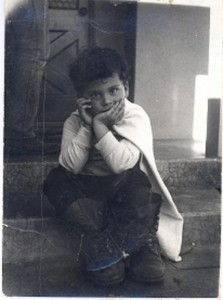Philip Metres is the author of twelve books, including Fugitive/Refuge (Copper Canyon 2024), Shrapnel Maps (Copper Canyon, 2020), The Sound of Listening: Poetry as Refuge and Resistance (University of Michigan, 2018), Sand Opera (Alice James, 2015), and I Burned at the Feast: Selected Poems of Arseny Tarkovsky (Cleveland State, 2015). His work—poetry, translation, essays, fiction, criticism, and scholarship—has garnered fellowships from the Guggenheim Foundation, the Lannan Foundation, the National Endowment for the Arts, the Ohio Arts Council, the Watson Foundation. He is the recipient of the Adrienne Rich Award, three Arab American Book Awards, the Lyric Poetry Prize, and the Cleveland Arts Prize. Metres has been called “one of the essential poets of our time,” whose work is “beautiful, powerful, magnetically original.” He is professor of English and director of the Peace, Justice, and Human Rights program at John Carroll University. He lives with his family in Cleveland, Ohio. Follow him on Twitter and Instagram @PhilipMetres
Long bio:
Born in San Diego on July 4th, 1970, the son of a Lebanese American Vietnam Veteran and a ex-convent novitiate of Irish and German extraction, Philip Metres grew up outside Chicago, attended Loyola Academy and College of the Holy Cross, and spent the following year in Russia on a Thomas J. Watson Fellowship pursuing an independent project called “Contemporary Russian Poetry and Its Relationship to Historical Change.” Since receiving a Ph.D. in English and an M.F.A. in creative writing from Indiana University in 2001, Metres has written and translated over fifteen books and chapbooks, including Shrapnel Maps (forthcoming 2020), The Sound of Listening: Poetry as Refuge and Resistance (2018), Pictures at an Exhibition (2016), Sand Opera (2015), I Burned at the Feast: Selected Poems of Arseny Tarkovsky (2015), Compleat Catalogue of Comedic Novelties: Poetic Texts of Lev Rubinstein (2014), Concordance of Leaves (2013), abu ghraib arias (2011), Ode to Oil (2011), To See the Earth (2008), Behind the Lines: War Resistance Poetry on the American Homefront since 1941 (2007), Instants (2006), Catalogue of Comedic Novelties: Selected Poems of Lev Rubinstein (2004), and A Kindred Orphanhood: Selected Poems of Sergey Gandlevsky (2003).
His writing has appeared widely, including in Best American Poetry, and has garnered the Guggenheim Fellowship, two NEA fellowships, three Arab American Book Awards, the Lannan Literary Fellowship, the Thomas J. Watson Fellowship, seven Ohio Arts Council Grants, the Adrienne Rich Award for Poetry, the PEN/Heim Translation Grant, the Beatrice Hawley Award, the Akron Poetry Prize, the Anne Halley Prize, the Creative Workforce Fellowship, the Cleveland Arts Prize, and the inaugural George W. Hunt, S.J. Award for Excellence in Journalism, Literature & the Arts.
His work has been called “beautiful, powerful, magnetically original” (Cleveland Arts Prize citation). Lawrence Joseph has written that “Philip Metres’s poetry speaks to us all, in ways critical, vital, profound, and brilliant.” His poems have been translated into Arabic, Farsi, Polish, Russian, and Tamil.
Were it not for the Ellis Island effect, his last name would be Abourjaili.
Interviews and Profiles
- Interview with David Naimon. Between the Covers. July 1, 2020
- Interview with Milena Williamson in Writer’s Chronicle. April 2021. (subscribers only)
- Interview in Under a Warm Green Linden. February 5, 2020.
- Interview/Profile in the Cleveland Plain Dealer. April 15, 2019.
- Interview with T Hetzel on Living Writers show at WCBN. November 14, 2018.
- Interview with Emma DiPasquale. University of Michigan Press blog. October 1, 2018.
- Interview with Brandon North. Full Stop. September 12, 2018.
- Interview with Carrie Wise. The Sound of Applause. WCPN Ideastream. August 29, 2018.
- Interview with Mairead Hadley. Faculty Spotlight at 24 Pearl Street Blog. August 2018.
- Interview with Matthew Tuckner. Bennington Review. July, 2018.
- Interview with Brainard Carey. Yale University Radio. July 3, 2018.
- Interview with Marie Ostrand, Ashberyland, December 2017.
- Interview with Megan Valley. Midwestern Gothic. May 11, 2017.
- Interview with Ilya Kaminsky: Poets and Borders Forum. Poetry International. February 2017.
- Interview with Kaveh Akbar. Divedapper. August 2016.
- Interview with Roy Scranton. Los Angeles Review of Books. August 2016.
- Interview with Rewa Zeinati. Sukoon. June 2016.
- Kenyon Review Conversation, May 2016
- Interview with Dan Poletta. The Sound of Applause. April 18, 2016.
- Interview with Randa Jarrar for the PEN TEN project. PEN America, November 2015.
- Interview with Nin Andrews. Best American Poetry Blog. February 28, 2015
- Interview with Fady Joudah. Los Angeles Review of Books. February 23, 2015.
- Interview with Andrew Summerson on Vatican Radio. February 28, 2015.
- Interview by William Kelley Woolfitt. Speaking of Marvels. March 28, 2014.
- Interview by Dee Perry. The Sound of Applause. WCPN 90.3. August 13, 2013.
- Interview by John Hoppenthaler. Congeries. July 2013.
- “Philip Metres on Refusing to Cede the Story of our Nation” by H.L. Hix. In/Quire. March 17, 2013.
- Best American Poetry Interview by Nin Andrews. March 8, 2014.
- Interview by Dee Perry. Around Noon. WCPN 90.3. July 9, 2012.
- Parsing Arias: A Dialogue through ‘Abu Ghraib Arias’” by Micah Cavaleri and Philip Metres. Jacket2. April 2012.
- “Interview with Philip Metres: Literature and Uprising” by Hilary Plum. Kenyon Review Online. May 17, 2011.
- From Charles Reznikoff to Chuck D. Poetry Off the Shelf. 2008.
- “Gray Matters.” Profile in Cleveland Magazine.
- “On the Corner with Bryan Sanders” on Come Together: Imagine Peace. Blog Talk Radio. 2008
- “Translated by” Interview by Shaindel Beers about Translation. Blog Talk Radio. 2008
- Moe Green Poetry Hour Interview by Rafael Alvarado. 2008
- Interview by Dee Perry. Around Noon. WCPN 90.3. April 8, 2008.
- Blog Talk Radio Interview by Carlye Archibeque on Behind the Lines. September 2007.
